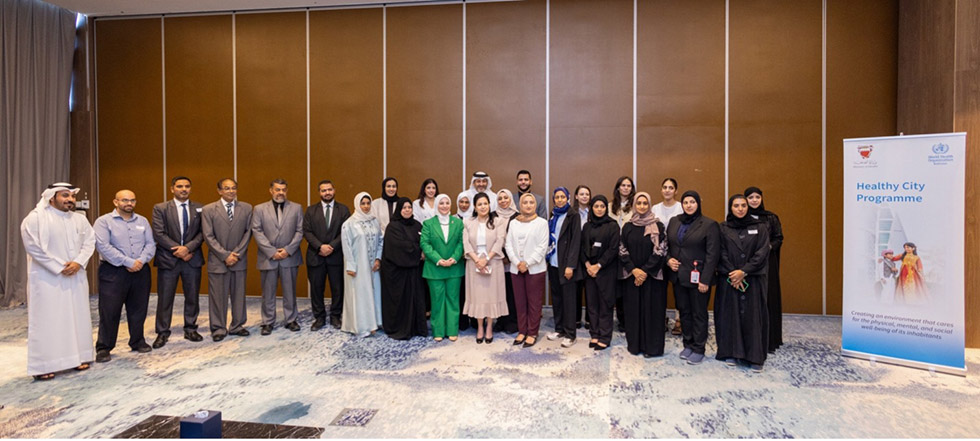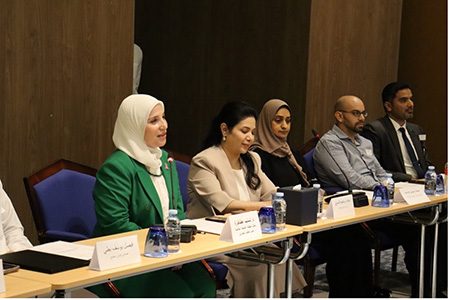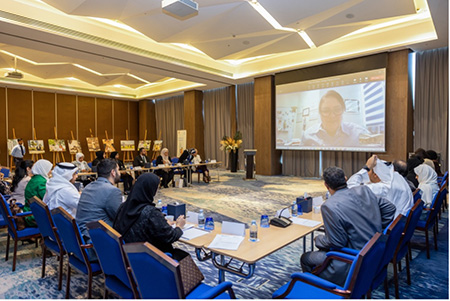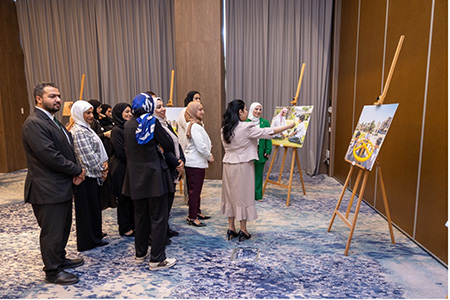 The multisectoral workshop involved more than 25 participants from the Ministry of Health and from the Capital, Muharraq, Northern and Southern governorates. Photo credit: WHO/WHO Bahrain
The multisectoral workshop involved more than 25 participants from the Ministry of Health and from the Capital, Muharraq, Northern and Southern governorates. Photo credit: WHO/WHO Bahrain
15 October 2023, Manama, Bahrain – Led by Bahrain’s Ministry of Health, in collaboration with WHO, a one-day Healthy Cities Programme Exchange of Experiences Workshop and Photography Exhibition was held in Manama, Bahrain, on 5 October 2023. The sharing of experiences among cities can lead to capacity-building and hence to the sustainability of the Healthy Cities initiative in Bahrain.
Bahrain currently has 4 Healthy Cities. Umm Al-Hassam was the country’s first city to be designated as such, in 2018. Manama followed in 2021 – becoming the first capital city in the Eastern Mediterranean Region to earn the distinction. Two further cities were awarded Healthy City status in 2022: Busaiteen/Al-Sayah and A’ali.
 Dr Tasnim Atatrah, WHO Representative in Bahrain, and Dr Wafa Alsharbati, Director of Health Promotion, present their opening remarks to kick off the Healthy Cities Exchange of Experiences Workshop and Photography Exhibition. Photo credit: WHO/WHO BahrainImplementation of the Healthy Cities initiative represents a significant commitment from Bahrain in line with the 2030 Agenda for Sustainable Development and towards achieving the regional vision of Health for All by All. The WHO Regional Office for the Eastern Mediterranean first adopted the Healthy Cities Programme in 1990 as a dynamic movement and multisectoral platform through which to advance public health in urban areas.
Dr Tasnim Atatrah, WHO Representative in Bahrain, and Dr Wafa Alsharbati, Director of Health Promotion, present their opening remarks to kick off the Healthy Cities Exchange of Experiences Workshop and Photography Exhibition. Photo credit: WHO/WHO BahrainImplementation of the Healthy Cities initiative represents a significant commitment from Bahrain in line with the 2030 Agenda for Sustainable Development and towards achieving the regional vision of Health for All by All. The WHO Regional Office for the Eastern Mediterranean first adopted the Healthy Cities Programme in 1990 as a dynamic movement and multisectoral platform through which to advance public health in urban areas.
 Dr Samar Elfeky, Regional Adviser, Health Promotion and Social Determinants of Health, gave a presentation on the expansion of the Healthy Cities Programme and introduced the WHO Global Network for Age-friendly Cities and Communities. Photo credit: WHO/WHO BahrainAll Bahrain’s governorates have registered to join the Regional Healthy City Network. Moreover, they have pledged to expand the initiative beyond individual cities to encompass their entire respective governorates.
Dr Samar Elfeky, Regional Adviser, Health Promotion and Social Determinants of Health, gave a presentation on the expansion of the Healthy Cities Programme and introduced the WHO Global Network for Age-friendly Cities and Communities. Photo credit: WHO/WHO BahrainAll Bahrain’s governorates have registered to join the Regional Healthy City Network. Moreover, they have pledged to expand the initiative beyond individual cities to encompass their entire respective governorates.
Healthy Cities Exchange of Experiences Workshop
This interactive, multisectoral workshop brought together more than 25 participants from the Ministry of Health and from the Capital, Muharraq, Northern and Southern governorates to exchange and share their experiences of the initiative. The existing Healthy Cities played an important role in highlighting best practices and lessons learned towards expanding the Healthy Cities Programme beyond individual cities towards entire governorates.
Introductory addresses were given by Dr Tasnim Atatrah, WHO Representative in Bahrain, and Dr Wafa Alsharbati, Director of Health Promotion, Ministry of Health.
“This initiative is a remarkable and one-of-a-kind achievement that brings together all governorates under one roof. It serves as an encouraging example of Bahrain’s strides towards scaling up the WHO Healthy Cities Programme and of the country’s work towards achieving WHO’s Triple Billion Goal, of a billion more people with better health and well-being,” said Dr Tasnim Atatrah, WHO Representative in Bahrain.
Dr Samar Elfeky, Regional Adviser, Health Promotion and Social Determinants of Health, WHO Regional Office for the Eastern Mediterranean, gave a presentation on the expansion of the Healthy Cities Programme to entire governorates.
Dr Elfeky also introduced the WHO Global Network for Age-friendly Cities and Communities. Healthy Cities can collaborate with this other transnational network to ensure that cities and communities are inclusive and equitable places that leave no one behind.
 Dr Wafa Alsharbati, Dr Tasnim Atatrah and participants explore the Healthy Cities Photography Exhibition. Photo credit: WHO/WHO BahrainHealthy Cities Photography Exhibition
Dr Wafa Alsharbati, Dr Tasnim Atatrah and participants explore the Healthy Cities Photography Exhibition. Photo credit: WHO/WHO BahrainHealthy Cities Photography Exhibition
An exhibition held alongside the workshop gave a visual representation of the whole-of-society approach involved in scaling up the Healthy Cities Programme across each of Bahrain’s 4 Healthy Cities.
The exhibition highlighted the main feature of each city:
Manama – Living in Entrepreneurship;
Umm Al-Hassam – Living in Heritage;
A’ali – Living in Art; and
Busaiteen/Al-Sayah – Living in Knowledge.
Related articles
Healthy Cities initiative expands to governorates in Bahrain
WHO designates 2 additional cities in Bahrain as healthy cities
WHO designates 5 pioneering universities in Bahrain as health-promoting universities


